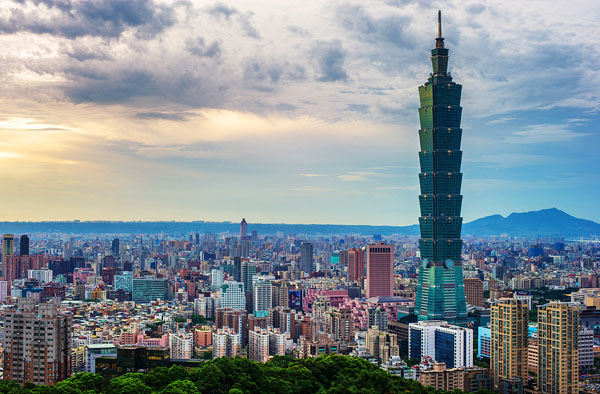
Taipei 101 Tower, a landmark in Taipei, Taiwan, is seen in this photo. [Photo/VCG]
In the report he presented to the 20th National Congress of the Communist Party of China on Sunday, Xi Jinping, general secretary of the CPC Central Committee, said the complete reunification of the motherland can and should be realized, drawing huge applause from the delegates.
On Aug 10, a white paper titled "The Taiwan Question and China's Reunification in the New Era" also asserted that the CPC will unswervingly promote the complete reunification of the motherland and that the process of complete reunification was unstoppable, demonstrating the determination of the Party, the Chinese government and the Chinese people to defend the country's sovereignty and territorial integrity.
The complete reunification of the motherland has two aspects. The first is to completely wipe away the humiliation inflicted upon the Chinese nation by the imperialist powers. After the Opium War in 1840, the imperialist powers began to seriously violate the country's sovereignty and territorial integrity. The Chinese people have been working since then to realize the complete reunification of the motherland.
Under the Party's leadership, China put an end to the colonial rule in Hong Kong and Macao in 1997 and 1999 respectively, and united them with the motherland under the "one country, two systems" framework. Since then, solving the Taiwan question has become the last hurdle to complete national reunification.
Second, the reunification of the two sides across the Taiwan Straits is more than the reunification of the mainland and the island. It is about Taiwan residents identifying with the Chinese nation and Chinese culture.
Based on over 20 years of governing experience in the Hong Kong and Macao special administrative regions after their return to the motherland, the complete national reunification requires social and cultural integration of the two sides of the Straits. Therefore, it is necessary to eliminate the political, cultural and material foundations of "Taiwan independence" and establish a legal system that reflects the central government's authority, so as to make national reunification permanent.
For various historical reasons, Taiwan, which shares the same language and ethnicity with the Chinese mainland, has not yet reunified with the motherland, and follows a socioeconomic development model that is significantly different from the mainland's. And many Taiwan compatriots lack understanding and first-hand experience of the mainland's existing system.
Therefore, the CPC has put forward the policy of "peaceful reunification" and "one country, two systems" to realize complete national reunification. Realizing complete national reunification in a peaceful way is in the best interest of the Chinese people including Taiwan compatriots, and conducive to the nation's long-term development.
Besides, the mainland has made remarkable achievements in many fields including economic growth, national defense and high-tech innovation, and the one-China principle has the overwhelming support of the international community. In fact, the mainland is powerful enough to snuff out any attempt to split Taiwan from the motherland, and the growing gap between the two sides of the Straits in strength gives the mainland a strategic advantage to realize national reunification peacefully.
Considering that the Taiwan question is complicated and needs time to be effectively solved, and to ensure the island's peace and development are maintained after reunification, Beijing has proposed "two systems" as the first choice of peaceful reunification.
The strategic framework of "peaceful reunification" and "one country, two systems" has withstood the test of time. The framework not only reflects a high degree of unity between strict principles and flexible policies, but also reflects the Chinese tradition of inclusiveness and tolerance.
As for the United States, it supports Taiwan in order to maintain its own global hegemony. And it is because of the US' support that foreign forces and the separatists on the island have been making waves across the Straits by trying to stall the process of reunification.
US House Speaker Nancy Pelosi's visit to Taiwan on Aug 2 and the Senate Foreign Relations Committee's approval of the Taiwan Policy Act of 2022 are recent proofs that Washington has been challenging the bottom line of Beijing. And thanks to the US' encouragement, the Taiwan authorities have been strutting in borrowed plumes and stigmatizing the 1992 Consensus that there is only one China and "one country, two systems", while echoing the Western concepts of "freedom" and "democracy".
For compatriots on both sides of the Straits, the Taiwan question has always been about the nation's sovereignty and territorial integrity, rather than a matter of ideology as the West believes. So it is not possible for the island administration to change the nature of the Taiwan question. Complete national reunification is inevitable and necessary for the great rejuvenation of the Chinese nation.
The Taiwan question, which emerged due to the weakness of the Chinese nation in the past, will be effectively solved with national rejuvenation. The complete reunification of the motherland is a sacred historical task for, and the shared aspiration of, all Chinese people. It is where the fundamental interest of the Chinese nation lies.
The author is a professor at the Institute for Taiwan Studies, Tsinghua University.